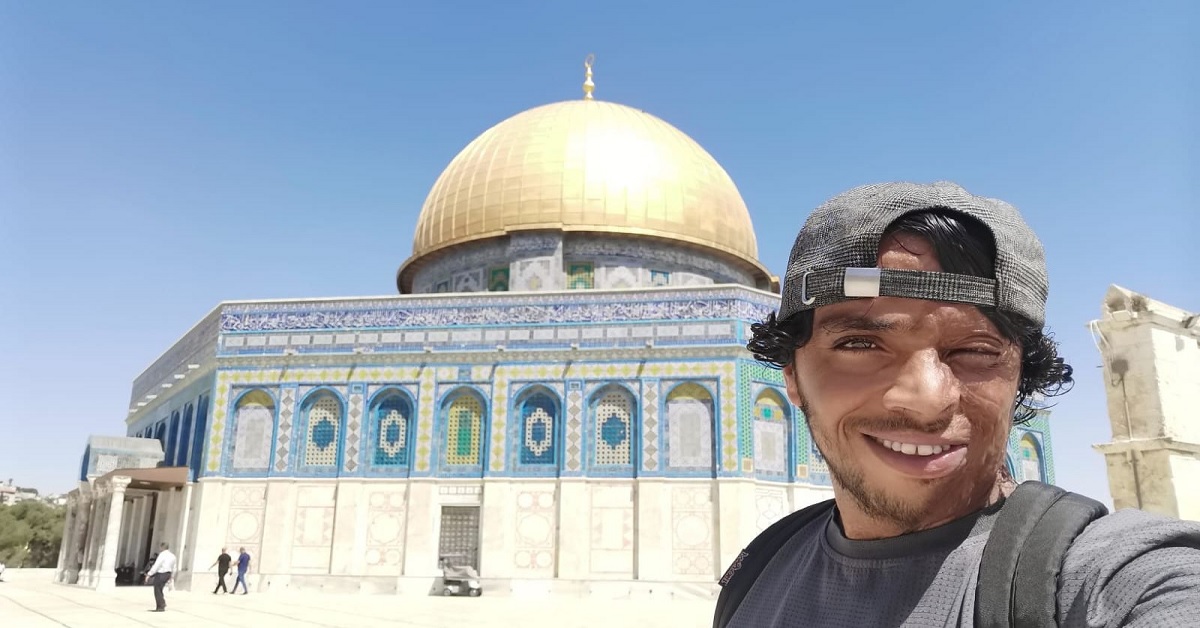Awdah Hathaleen, a 31-year-old Palestinian English teacher, father of three, and a prominent voice of non-violent resistance in the South Hebron Hills, was shot and killed on Monday by an Israeli settler in the village of Umm al-Kheir. The incident occurred in full daylight, amid an escalation of settler violence across the occupied West Bank.
The report of Al Jalzeera states that the killer, Yinon Levi, a settler from the nearby illegal outpost of Carmel, opened fire indiscriminately after tensions flared over a bulldozer damaging Palestinian infrastructure. The bullet struck Hathaleen in the chest as he stood near the community centre yard—a space he helped build, and where he taught children the English language.
According to the report of The Guardian, despite his critical injury, Israeli forces did not allow a Palestinian ambulance to take him. Instead, a military ambulance from the Carmel settlement transported him. Later that night, Israeli authorities informed his family of his death—without returning his body. To date, Israeli officials continue to withhold the body, in violation of Islamic customs that require immediate burial.
Sequence of events leading to the killing
The violence began the day prior, when a settler-operated bulldozer entered Umm al-Kheir and began destroying agricultural land and vital infrastructure, including a water pipe. Villagers had attempted to coordinate its passage to avoid such destruction, but their warnings were ignored. According to witnesses, the bulldozer operator used the vehicle’s claw to strike a villager in the head, leaving him semi-conscious.
As villagers gathered to protest, according to AP News, Levi reportedly emerged with a gun and began firing toward the crowd. Hathaleen was standing at a distance of about 10–15 metres, observing the unfolding situation. One eyewitness, Israeli activist Mattan Berner-Kadish, recounted to Al Jalzeera that Levi showed no remorse and was overheard saying: “I’m glad I did it.”
Berner-Kadish also stated that Israeli soldiers who arrived at the scene expressed sympathy with Levi, with at least three soldiers allegedly saying they wished they had shot Awdah themselves.
Aftermath and military crackdown
Following the killing, the Israeli army sealed off the village, declaring it a closed military zone, and arrested at least five members of the Hathaleen family. Among the detainees were relatives of the deceased and two international solidarity activists. Soldiers stormed the mourning tent, evicted mourners, and threw stun grenades at journalists and residents who resisted dispersal.
According to Vulture, despite the declared military closure, video footage later emerged showing a settler operating a bulldozer within the village, highlighting the disparity between military restrictions on Palestinians and impunity for settler activity.
Meanwhile, Israeli authorities charged Levi with negligent homicide, not murder. He was released to house arrest within three days. Levi had previously been sanctioned by the European Union, United Kingdom, and United States under President Joe Biden for violent settler attacks—but was delisted by Donald Trump on his first day in office.
A legacy of peace and education
Awdah was deeply embedded in the cultural and resistance life of Masafer Yatta. A teacher by profession and an activist by necessity, he taught English to grades 1 through 9 in the local school, believing language could be a tool to amplify Palestinian voices globally.
He was also a co-producer and on-screen voice in the Oscar-winning documentary “No Other Land,” directed by Basel Adra and Yuval Abraham, which captured Israel’s systemic efforts to evict Palestinian communities from their homes in the firing zones of Masafer Yatta.
Beyond activism, Awdah was remembered as a devoted father to three young children—Watan (5), Muhammad (4), and Kinan (7 months)—and a vibrant presence in the community. He was known for his love of football, often playing with children on the makeshift pitch outside the community centre, and for his affection for Real Madrid. He was also described as a coffee connoisseur, regularly gifted Italian coffee by international allies.
“There was nobody who contributed as much to the community in Umm al-Kheir as Awdah,” said his cousin and brother-in-law, Alaa Hathaleen, as reported by Al Jalzeera.
“He was a radical humanist,” said Micol Hassan to Al Jalzeera, an Italian-Jewish activist and close friend who has been barred by Israel from reentering the West Bank.
Final message and global response
In a message sent just hours before his death, Awdah warned: “The settlers are working behind our houses… they tried to cut the main water pipe… If you can reach people like the Congress, courts, whatever, please do everything.”
His killing has drawn international condemnation. The French Foreign Ministry called it “a form of terrorism,” urging Israel to ensure accountability. Human rights lawyer Michael Sfard called settler violence “state violence” in Israel, citing widespread legal and military backing for settlers.
As reported by Al Jalzeera, Basel Adra, his colleague and co-director of No Other Land, wrote in mourning: “My dear friend Awdah was slaughtered this evening. This is how Israel erases us—one life at a time.”
Settler violence in context
The killing of Hathaleen is part of a broader pattern of increasing settler violence in the West Bank. Since October 2023, at least 1,009 Palestinians have been killed and over 7,000 injured, many in attacks involving armed settlers under the protection of Israeli military units. According to international law, all Israeli settlements in the occupied West Bank are illegal.
Umm al-Kheir, like many villages in Masafer Yatta, lies within Area C, a zone where Israel maintains full civil and military control. The entire region has been designated a “firing zone” by Israel, a status Palestinians say is used as a pretext to forcibly evict communities. Awdah had been documenting and resisting this very policy until the last day of his life.
Related:
Illegality of the Israeli Occupation of Palestine
Former DU Professor, Achin Vanaik, stands by his lecture on Palestine despite pressure
“Don’t pray for Palestine,” Delhi Police reportedly warns mosque imams

